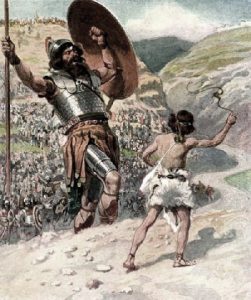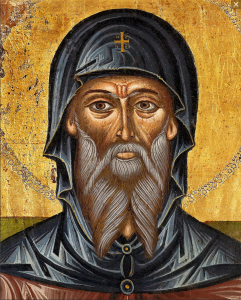Balancing Mercy and Faith, Law and Love:
Memorial, St Anthony, Abbot
(1 Sm 1732-51; Ps 144; Mk 3:1-6)
*************************************************
Why was Goliath so surprised when David struck him with a stone from his sling? Such a thing had never entered his head before!
The readings today, on this memorial of the abbot St. Anthony, provide us with three distinct yet related messages: mercy, faith and living a balanced life.
Regarding mercy, the Dalai Lamai taught his followers to “Learn the law very well so that you know how to disobey it properly.” That saying applies to Jesus in today’s gospel, as he breaks the Sabbath law by healing the man with a withered hand. So often, pious acts seem more meritorious than messy, concrete acts of love. In this incident, Jesus is very clear that the law of mercy trumps the law of ritual. How ironic it is that this very act of mercy infuriates the Pharisees to the point that they want to kill him, in the name of God because he broke the Sabbath law! Is this incident not a reminder of Pope Francis with his insistence that, for God, mercy is the core of love?
A second lesson is very obvious, and that is faith and trust in God. We need to be like David and place our complete trust and faith in God’s ability to do for us what we cannot do for ourselves. Like the man with the withered hand, we need to listen to the Words of Jesus and come to him for forgiveness and healing. We need to trust that Jesus hears our every plea, and will answer our prayers, in his own mysterious way and with God’s own mysterious timing. Above all, we need to trust that God will always draw good out of every painful situation that besets us. Faith empowers us to allow our suffering to make us better, not bitter.
Finally, we learn the importance of balancing faith with human effort. God wants us to learn the combination of faith and action that both the man with the withered hand and David showed, that balance between God’s grace and our work that can lead us into victory. David’s words to Goliath, “Today the Lord shall deliver you into my hand,” show how much he placed his confidence in the Lord. But even as he spoke these words, he picked up a stone, took aim, and fired that accurate shot.

The Word Among Us asks how often do we rely too much on God and neglect the work that God calls us to do, whether in evangelization or in our own growth in holiness? On the other hand, now often do we rely on our own strength, doing the “work of the Lord” but neglecting the “Lord of the work?” Both approaches are risky. The first one can leave us feeling fruitless and frustrated. The second one can leave us full of ourselves or worn out and dispirited. But the middle way – the way of cooperation between divine grace and human work – brings not only fruitfulness but refreshment and joy as well. We need to learn both the art of being still and knowing that God is God, and how to step out of the boat onto the surging waters of life. How can we step out in faith, trusting in God’s power as we fling our first stone?
The church offers us today another David as a model for us, the Abbot St. Anthony, who tackled the crisis of loss in his life. Much of what we know about him comes from a biography written by his close friend St Antanasius. Anthony was born into a wealthy Christian family in Upper Egypt about 251. Both his parents died while he was a teenager, leaving him with only a younger sister whom he cared for and also looked after their home.
Not six months after the death of his parents, as he was faithfully on his way to church, he began to think of how the apostles left everything and followed the Savior, and of those in the book of Acts who had sold their possessions and distributed the money to the needy. He reflected too on the great hope stored up in heaven for such as these. In the Gospel that day, he heard the Lord’s words to the rich young man: If you want to be perfect, go and sell all you have and give the money to the poor–you will have riches in heaven. Then come and follow me.

St Anthony, Abbot
It seemed to Anthony that it was God who had brought the saints to his mind and that the words of the Gospel had been spoken directly to him. He immediately left the church and gave away to the villagers the 200 acres of very beautiful and fertile land he had inherited, so that it would cause no distraction to him and his sister. Keeping a portion to care for her, he sold all his other possessions and gave the money to the poor.
The next time he went to church he heard the Lord say in the Gospel, Do not be anxious about tomorrow. Without a moment’s hesitation, he gave the poor all that he had left, after placing his sister in the care of some trustworthy persons and arranging for her to be brought up in a convent. Then he gave himself up the ascetic life, not far from his own home.
Anthony kept careful watch over himself and practiced great austerity. He did manual work because he had heard the words: If anyone will not work, do not let him eat. He spent some of his earnings on bread and the rest he gave to the poor. Having learned that we should always be praying, he prayed without ceasing. Indeed, he was so attentive when Scripture was read that nothing escaped him and because he retained all he heard, his memory served him in place of books.
St Anthony, icon
Seeing the kind of life Anthony lived, all who knew him called him the friend of God, and they loved him as both son and brother. He had a profound influence on the history of monasticism, for this was the beginning of Christian monastic life soon taking root elsewhere. In 311, Anthony went to Alexandria to encourage the Christians who were being persecuted. In 355, he returned to Alexandria to help his close friend Bishop Antanasius in the struggle against Arianism. Anthony died on January 17, 356, well known for his holiness, wisdom and asceticism.
The Eucharist is an act of faith and mercy, and our sling shot – our weapon against evil in the world and in our lives – that sends us out into the world, forgiven and healed, to balance faith in God with selfless acts of mercy and compassion.




Are talking about 1 Sm 17: 32 – 51 . I just want to make sure. I never thought you would have a homily today . Thank you thank you .
I had a sense that the readings is 1 Samuel 17 and the gospel of Mark .